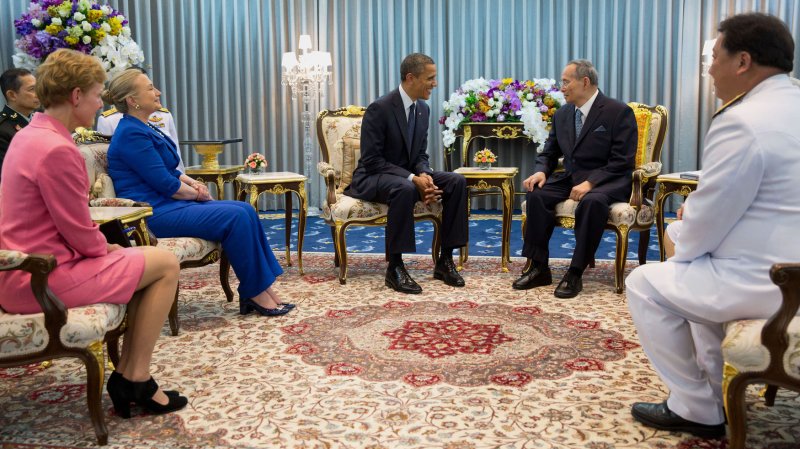President Barack Obama, with Secretary of State Hillary Rodham Clinton and Ambassador Kristie Kenney, left, meet with King Bhumibol Adulyadej of the Kingdom of Thailand, at Siriraj Hospital in Bangkok, Thailand, Nov. 18, 2012. UPI/Pete Souza/White House |
License Photo
PHNOM PENH, Cambodia, Nov. 20 (UPI) -- The Asia-Pacific pivot of U.S. President Barack Obama, who just ended his Asia trip, will move forward despite crises elsewhere, a U.S. official said.
At a media briefing in Cambodia prior to Obama's departure at the end of his three-nation Asia tour, Ben Rhodes, deputy national security adviser for strategic communications, was asked whether events such as the latest Gaza crisis in the Middle East would not overshadow the pivot, designed to re-focus in the Asia-Pacific region as the United States winds down operations in Iraq and Afghanistan.
Rhodes, citing Obama's historic visit to Myanmar, said there was evidence the government there and its people want to move in a democratic direction and want "a deeper relationship with us," which, besides advancing democracy, can also be a very important for bilateral relations.
"So that is a significant thing that we'll take away from this trip, even as throughout the last several days" Obama and his officials remained in touch with counterparts on the Gaza situation.
"You know the pivot, in many respects, reflects not just the time that we're spending here -- which is significant -- but it's also resource allocation. And so much of our resources the last 10 years have been in Iraq, principally, and then Afghanistan," Rhodes said.
He said as those resources "are dramatically reduced," it not only "creates time and space for the president and other senior officials" to prioritize the security presence and economic engagement in the Asia-Pacific region, as well prioritize support for democracy and human rights, "which was such an important part of this trip as well."
"So we'll continue to move forward with our pivot, even as we'll manage the inevitable crises and challenges that will come up in other regions," Rhodes added.
In Thailand, Obama, while explaining the Asia-Pacific pivot, said "the United States is and always will be a Pacific nation." He said as the fastest-growing region in the world, "the Asia Pacific will shape so much of our security and prosperity in the century ahead, and it is critical to creating jobs and opportunity for the American people. And that's why I've made restoring American engagement in this region a top priority as president."
The new policy has been put in place at a time when China's military might and its territorial claims in the South China Sea are growing, raising concerns among its smaller neighbors. China's dispute with Japan, a close Asian ally of the United States, over the Senkaku Islands in the East China Sea also are worsening.
The pivot has raised concerns in China with its official media severely attacking the policy. However, Obama in his talks with Chinese Premier Wen Jiabao in Cambodia Tuesday assured he is committed to working with Beijing.















